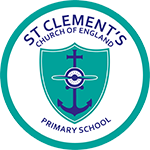History
Intent
At St Clement's Primary School, we teach History in a way that inspires our children to want to know about the past. The curriculum includes historical events that have occurred in Britain, from the earliest times to the present day. Our children are encouraged to consider these times and how people’s lives have been influenced as a result.
The substantive knowledge taught in the curriculum has been carefully chosen and sequenced using a chronological approach. Understanding in history requires an understanding of causation. Children will be able to understand the causes of significant national and global events, (such as World War I), when they have some background knowledge of what happened before (such as the origins and growth of European empires, including the British Empire).
At St Clement's Primary School, we believe the teaching of history should ignite our children’s curiosity, develop their knowledge of the past and motivate them to develop an enquiring mind. We do this by teaching the skills and knowledge necessary to become a good historian. These include: researching and gathering information; examining primary and secondary sources and their reliability based on an understanding of how evidence is used to make historical claims and why contrasting arguments and interpretations have been constructed; analysing evidence to justify or explain their own reasoning and pose historically valid questions. Our children will be taught to think critically when exploring a range of sources, asking perceptive questions, weighing up evidence, whilst trying to form connections and record their own structured accounts.
Our children progressively build their history skills and knowledge, beginning with their own experiences and lives of their families, in order to give context and meaning to history and its chronology. They will leave St Clements with a coherent knowledge and understanding of Britain’s history, their locality and the history and influence of the wider world, including the nature of ancient civilisations, the dissolution of empires and characteristics features of past non-European societies. The children will understand historical concepts such as continuity and change, cause and consequence, similarity, difference and significance. They will use this understanding to draw contrasts, make connections between and have a good understanding of the chronology of key historical periods, local, national and international history, significant individuals and their own lives, encouraging them to question and investigate how life today came about and has been influenced and impacted by the events of the past.
The curriculum is planned so that knowledge, skills and understanding builds on what the children have been taught with clearly defined end points. Children are exposed to a range of sequential knowledge of the past and its events, building on a range of historical skills throughout every year group such as: chronology, vocabulary and making comparisons alongside this. Our curriculum reflects that children may not have the same experiences as their peers and aims to provide all children with rich and meaningful historical learning across a range of topics and events.
Implementation
History is taught utilising the Kapow schemes of work and following our whole school overview. The units have been selected to provide a breadth of both national and international events, time periods, civilisations and significant individuals. These are also being supplemented by local history studies.

 St Clement's Church of
England Primary School
St Clement's Church of
England Primary School